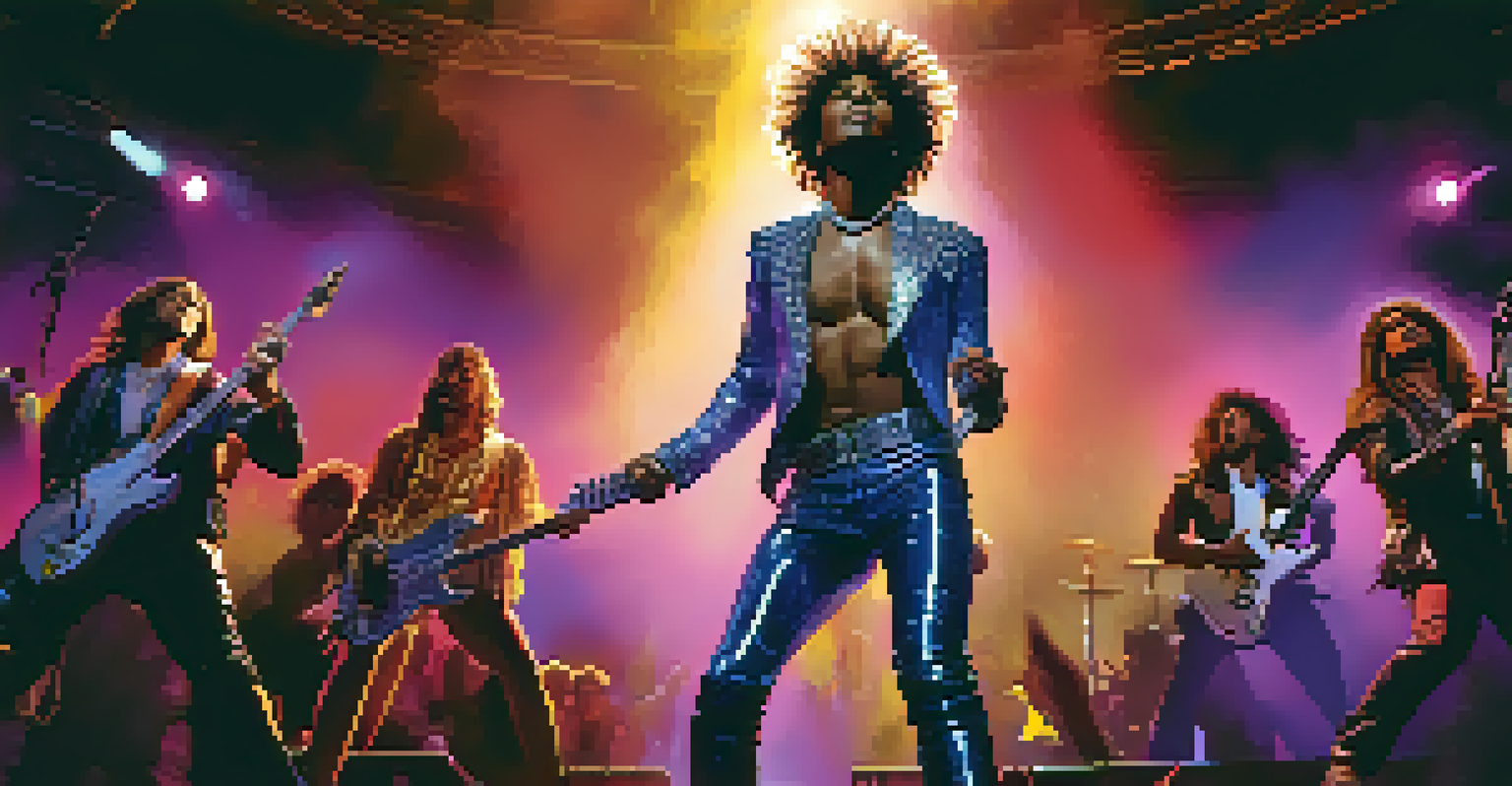Exploring Gender Identity Through Music Genres

The Connection Between Music and Gender Identity
Music has always been a powerful medium for self-expression, particularly when it comes to exploring gender identity. From the soulful ballads to the rebellious punk anthems, different genres create spaces where individuals can articulate their experiences and feelings. For many, music serves as a reflection of their inner selves, allowing them to resonate with artists who share similar gender journeys.
Music can change the world because it can change people.
Consider how pop music often embraces fluidity in gender expression, with artists like Sam Smith and Janelle Monáe leading the way. Their songs not only highlight personal struggles but also challenge traditional gender norms, making listeners feel seen and understood. This connection between music and identity can ignite conversations about acceptance and authenticity.
In essence, music genres can act as a mirror, reflecting diverse gender identities and contributing to broader societal discussions. As we delve deeper into specific genres, we'll uncover how they shape and are shaped by the experiences of those navigating their gender identities.
Rock: A Platform for Rebellion and Gender Exploration
Rock music has long been associated with rebellion, making it a natural platform for exploring gender identity. Artists like David Bowie and Freddie Mercury used their music to challenge societal norms and redefine what it means to be masculine or feminine. Their daring personas encouraged fans to embrace their own identities, no matter how unconventional.

The genre's raw energy and unfiltered lyrics often speak to the struggles of self-acceptance and societal pressure. For many listeners, rock anthems provide an empowering soundtrack for their journeys, promoting the idea that it's okay to be different. This sense of community fosters a safe space where individuals can express their true selves.
Music as Gender Identity Mirror
Various music genres serve as reflections of diverse gender identities, fostering conversations around acceptance and authenticity.
Furthermore, the emergence of feminist rock bands, such as The Runaways and Sleater-Kinney, has further amplified discussions around gender. These artists not only challenge gender stereotypes but also inspire a new generation to explore their identities fearlessly.
Hip-Hop: A Complex Narrative of Gender Identity
Hip-hop is a genre rich with storytelling, often reflecting the complexities of gender identity within its narratives. Artists like Lil Nas X and Cardi B have brought conversations about sexuality and gender fluidity to the forefront, showcasing the diversity within the hip-hop community. Their bold lyrics and unapologetic personas challenge traditional notions of masculinity and femininity.
The role of music in the development of gender identity is crucial; it helps us understand ourselves and our place in the world.
While hip-hop has historically been critiqued for its portrayal of gender roles, many contemporary artists are redefining what it means to be a part of this genre. They are using their platforms to advocate for LGBTQ+ rights and promote acceptance, creating a space where listeners can feel represented. This shift not only empowers artists but also resonates deeply with fans who relate to these narratives.
In this way, hip-hop serves as both a reflective surface and a catalyst for change, pushing boundaries and inspiring dialogue about gender identity. As we listen to these powerful voices, we can understand the genre's role in shaping perceptions and fostering inclusivity.
Pop Music: Celebrating Fluidity and Self-Expression
Pop music is often seen as the genre that embraces fluidity, making it a prime space for exploring gender identity. With artists like Lady Gaga and Billie Eilish challenging traditional labels, pop songs frequently celebrate individuality and self-expression. Their catchy hooks and relatable lyrics allow listeners to connect with themes of acceptance and personal discovery.
The vibrant visuals and performances associated with pop music also play a crucial role in conveying messages about gender. Music videos often showcase diverse representations, pushing back against rigid gender norms. This creates an environment where fans feel encouraged to express themselves authentically, leading to a cultural shift toward greater acceptance.
Rock and Hip-Hop Challenge Norms
Artists in rock and hip-hop use their platforms to redefine gender norms and promote inclusivity through powerful narratives.
Moreover, the collaboration between artists of various gender identities in pop music highlights the importance of inclusivity. These partnerships send a powerful message that gender is not a barrier but rather an aspect of identity that deserves celebration, further enriching the genre's narrative.
Country Music: Challenging Traditional Gender Roles
Country music has historically been seen as a bastion of traditional gender roles, but recent artists are challenging this perception. Figures like Kacey Musgraves and Brandi Carlile are using their platforms to explore themes of gender identity and sexuality, often weaving personal stories into their lyrics. Their openness encourages fans to reflect on their own experiences and question societal expectations.
The genre's storytelling nature resonates deeply with listeners, creating a sense of familiarity and connection. By addressing issues like love, heartbreak, and self-acceptance, these artists are breaking down barriers and expanding the narrative of what country music can encompass. This evolution is vital for fostering a more inclusive community within the genre.
As country music continues to evolve, it offers a unique perspective on gender identity, allowing for the exploration of nuanced experiences. This shift not only enriches the genre but also provides a voice for those who may have felt marginalized within its confines.
Electronic Music: A Space for Innovation and Identity
Electronic music has carved out a niche as a genre that thrives on innovation and experimentation, making it a fertile ground for exploring gender identity. Artists like SOPHIE and Arca have pushed the boundaries of sound while simultaneously challenging traditional gender norms. Their work invites listeners to question the very nature of identity and gender expression.
The fluidity inherent in electronic music allows for a diverse range of voices and experiences to emerge. With its emphasis on collaboration and remix culture, electronic music fosters an environment where artists can redefine themselves and experiment with their identities. This inclusivity resonates with fans who seek a space that embraces diversity.
Pop and Indie Foster Self-Expression
Pop and indie music celebrate fluidity and authenticity, creating supportive environments for individuals to explore their gender identities.
Moreover, electronic festivals have become hotspots for self-expression, where attendees feel free to embody their true selves. The vibrant atmosphere and acceptance of different identities create a community that champions individuality, further solidifying the genre's role in the exploration of gender identity.
Indie Music: Authentic Voices and Diverse Narratives
Indie music has emerged as a powerful platform for authentic voices and diverse narratives, allowing artists to share their experiences with gender identity. With its emphasis on raw emotion and personal storytelling, indie music often resonates deeply with listeners who relate to these journeys. Artists like Phoebe Bridgers and Mitski have garnered attention for their poignant lyrics that delve into themes of identity and self-discovery.
The DIY ethos of the indie scene encourages artists to express themselves freely, challenging mainstream notions of gender. This space fosters creativity and innovation, creating an environment where diverse identities can flourish. For fans, indie music becomes a refuge where they can explore their own gender identities in a supportive community.

As the indie genre continues to grow, it plays a crucial role in amplifying underrepresented voices. This commitment to authenticity not only enriches the music landscape but also fosters deeper connections among listeners navigating their own gender journeys.
Conclusion: The Power of Music in Shaping Gender Identity
In conclusion, exploring gender identity through music genres reveals the profound impact of sound on personal and communal experiences. Each genre offers unique pathways for artists and listeners alike to express themselves and connect with others. Whether it's rock, hip-hop, pop, country, electronic, or indie music, the themes of gender identity resonate across the board, creating a tapestry of voices that challenge societal norms.
As we celebrate the diversity within these genres, we also recognize the importance of representation and authenticity. Music has the power to foster understanding, acceptance, and love, encouraging individuals to embrace their true selves. This ongoing dialogue around gender identity is crucial for creating a more inclusive world, both in music and beyond.
Ultimately, the exploration of gender identity through music not only enriches our cultural landscape but also empowers individuals to find their voices. As we continue to listen and support these artists, we participate in a collective journey toward acceptance and self-expression.